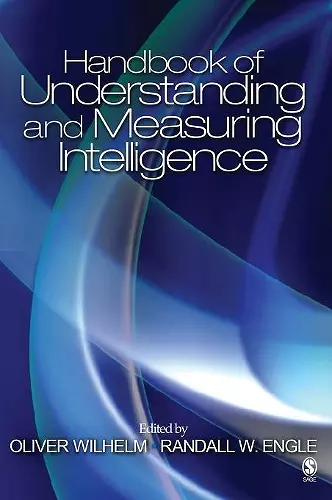Handbook of Understanding and Measuring Intelligence
Oliver Wilhelm editor Randall W Engle editor
Format:Hardback
Publisher:SAGE Publications Inc
Published:11th Nov '04
Currently unavailable, and unfortunately no date known when it will be back

"...it is extremely useful and contemporary, covering among its five hundred pages, genetics, neuro-imaging and emotional intelligence. It also provides a good indicator of current psychological work in the area with empirical evidence and theory sitting alongside each other. The material on meta-cognition would, I suspect, be of most interest to philosophers, along with the more basic questions concerning the nature of memory and intelligence."
—PRACTICAL PHILOSOPHY
"This volume provides an in-depth yet accessible and up-to-date review of the key topics pertinent to current intelligence research. This state-of-the-art summary about our theoretical understanding of human abilities and their measurement is of interest for researchers, practitioners, and advanced students in psychology, education, and related disciplines. It′s a great summary and a good read on a truly important topic."
—Dr. Heinz Holling, University of Muenster
"Wilhelm and Engle have compiled a highly informative set of chapters on various topics related to intelligence. The chapters describing recent European work will be especially informative for North American readers. The work is strengthened by provision of review chapters that keep the reader in sight of the forest rather than the trees."
—Earl Hunt, University of Washington
Without an informed cognitive understanding of intelligence as a construct, the technology of intelligence testing will make little to no progress. Psychologists with a more psychometric background need detailed knowledge about the cognitive processes underlying intelligent behavior. Likewise, psychologists with a more cognitive or experimental background need to make more use of applied knowledge from psychometric research.
The Handbook of Understanding and Measuring Intelligence provides an overview of recent studies on intelligence to help readers develop a sound understanding of results and perspectives in intelligence research. In this volume, editors Oliver Wilhelm and Randall W. Engle bring together a group of respected experts from two fields of intelligence research, cognition and methods, to summarize, review, and evaluate research in their areas of expertise. The chapters in this book...
"This volume provides an in-depth yet accessible and up-to-date review of the key topics pertinent to current intelligence research. This state-of-the-art summary about our theoretical understanding of human abilities and their measurement is of interest for researchers, practitioners, and advanced students in psychology, education, and related disciplines. It′s a great summary and a good read on a truly important topic."
-- Dr. Heinz Holling"Wilhelm and Engle have compiled a highly informative set of chapters on various topics related to intelligence. The chapters describing recent European work will be especially informative for North American readers. The work is strengthened by provision of review chapters that keep the reader in sight of the forest rather than the trees."
-- Earl Hunt"...it is extremely useful and contemporary, covering among its five hundred pages, genetics, neuro-imaging and emotional intelligence. It also provides a good indicator of current psychological work in the area with empirical evidence and theory sitting alongside each other. The material on meta-cognition would, I suspect, be of most interest to philosophers, along with the more basic questions concerning the nature of memory and intelligence."
—PRACTICAL PHILOSOPHY -- Robert G. Hill
ISBN: 9780761928874
Dimensions: unknown
Weight: 1130g
552 pages